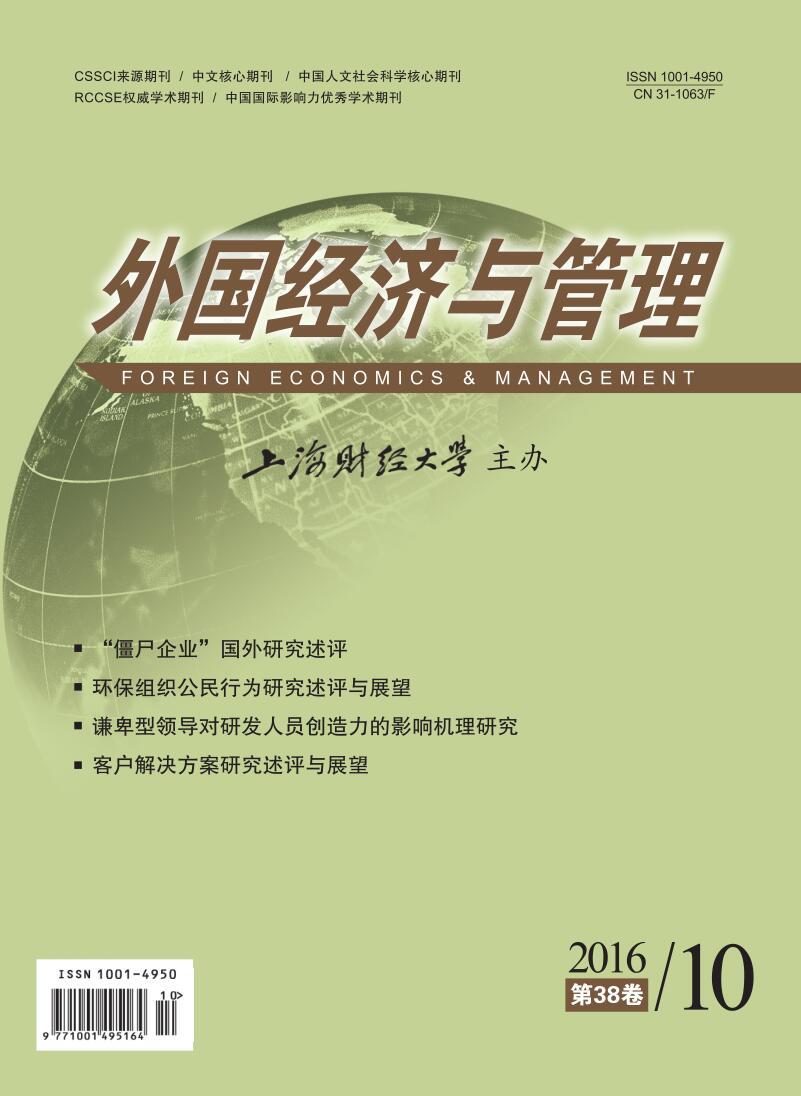谦卑型领导作为一种新型的支持型领导风格,已成为领导行为研究领域最新的热点问题,但对其有效性研究仍相对匮乏。研发人员作为企业创新的主体,他们的工作需要更高水平的自主性和自我成就感需要,因而,谦卑型领导行为对研发人员创造力的影响效果更为凸显。本文以研发人员作为调研对象,重点探究谦卑型领导对员工创造力的影响机理,并基于员工自我心理认知视角,考察员工心理资本在谦卑型领导与员工创造力之间的中介效应以及员工权力距离对该关系的调节效应。本文采用问卷调查法获得201名研发人员的有效样本,并采用结构方程模型和层级回归方法进行数据统计分析。研究结果表明:谦卑型领导对员工创造力产生正向促进作用;心理资本完全中介谦卑型领导对员工创造力的正向关系;权力距离负向调节谦卑型领导对员工创造力的影响作用,即员工权力距离越低,谦卑型领导对员工创造力的影响作用越强。研究结论丰富了谦卑型领导有效性的情景作用机制,为领导者在中国组织情境下开展“自下而上”的谦卑型领导行为提升员工创造力提供了新的见解。
谦卑型领导对研发人员创造力的影响机理研究
摘要
参考文献
16 尹晶, 郑兴山.上级反馈对员工创造力和组织公民行为的影响-领导-成员交换的中介作用[J].科学学与科学技术管理, 2011, (12):153-159.
19 张燕, 怀明云.威权式领导行为对下属组织公民行为的影响研究-下属权力距离的调节作用[J].管理评论, 2012, (11):97-105.
24 Cropanzano R, Bowen D E, Gilliland S W. The management of organizational justice[J]. Academy of Management Perspectives, 2007, 21(4):34-48.
25 Dorfman P W, Howell J P. Dimensions of national culture and effective leadership patterns:Hofstede revisited[A]. Farmer R N, Goun E G. Advances in International Comparative Management[M]. Greenwich, CT:JAI, 1988:127-149.
26 Dutton J E, Roberts L M, Bednar J. Pathways for positive identity construction at work:Four types of positive identity and the building of social resources[J]. Academy of Management Review, 2010, 35(2):265-293. DOI:10.5465/AMR.2010.48463334
27 Farh J L, Hackett R D, Liang J. Individual-level cultural values as moderators of perceived organizational support-employee outcome relationships in China:Comparing the effects of power distance and traditionality[J]. Academy of Management Journal, 2007, 50(3):715-729. DOI:10.5465/AMJ.2007.25530866
28 Greer T W. Humility isn't just personal anymore:Testing group-level humility in the organization[D]. Regent:Regent University, 2013.
29 Kirkman B L, Chen G, Farh J L, et al. Individual power distance orientation and follower reactions to transformational leaders:A cross-level, cross-cultural examination[J]. Academy of Management Journal, 2009, 52(4):744-764. DOI:10.5465/AMJ.2009.43669971
30 Leroy H, Palanski M E, Simons T. Authentic leadership and behavioral integrity as drivers of follower commitment and performance[J]. Journal of Business Ethics, 2012, 107(3):255-264. DOI:10.1007/s10551-011-1036-1
31 Luthans F, Avey J B, Avolio B J, et al. Psychological capital development:Toward a micro-intervention[J]. Journal of Organziational Behavior, 2006, 27(3):387-393. DOI:10.1002/(ISSN)1099-1379
32 Luthans F, Youssef C M, Avolio B J. Psychological capital:Developing the human competitive edge[M]. Oxford, UK:Oxford University Press, 2007.
33 Luthans F, Youssef C M, Rawski S L. A tale of two paradigms:The impact of psychological capital and reinforcing feedback on problem solving and innovation[J]. Journal of Organizational Behavior Management, 2011, 31(4):333-350. DOI:10.1080/01608061.2011.619421
34 Morris J A, Brotheridge C M, Urbanski J C. Bringing humility to leadership:Antecedents and consequences of leader humility[J]. Human Relations, 2005, 58(10):1323-1350. DOI:10.1177/0018726705059929
36 Owens B P, Hekman D R. Modeling how to grow:An inductive examination of humble leader behaviors, contingencies, and outcomes[J]. Academy of Management Journal, 2012, 55(4):787-818. DOI:10.5465/amj.2010.0441
37 Owens B P, Johnson M D, Mitchell T R. Expressed humility in organizations:Implications for performance, teams, and leadership[J]. Organization Science, 2013, 24(5):1517-1538. DOI:10.1287/orsc.1120.0795
38 Sweetman D, Luthans F, Avey J B, et al. Relationship between positive psychological capital and creative performance[J]. Canadian Journal of Administrative Sciences/Revue Canadienne des Sciences de L'administration, 2011, 28(1):4-13. DOI:10.1002/cjas.175
39 van Dierendonck D, Nuijten I. The servant leadership survey:Development and validation of a multidimensional measure[J]. Journal of Business and Psychology, 2011, 26(3):249-267. DOI:10.1007/s10869-010-9194-1
40 Zhang X M, Bartol K M. Linking empowering leadership and employee creativity:The influence of psychological empowerment, intrinsic motivation, and creative process engagement[J]. Academy of Management Journal, 2010, 53(1):107-128. DOI:10.5465/AMJ.2010.48037118
41 Zhou J, George J M. When job dissatisfaction leads to creativity:Encouraging the expression of voice[J]. Academy of Management Journal, 2001, 44(4):682-696. DOI:10.2307/3069410
引用本文
王艳子, 白玲, 罗瑾琏. 谦卑型领导对研发人员创造力的影响机理研究[J]. 外国经济与管理, 2016, 38(10): 76–88.
导出参考文献,格式为:
下一篇:家庭支持型主管行为研究述评与展望





 8890
8890  8335
8335

